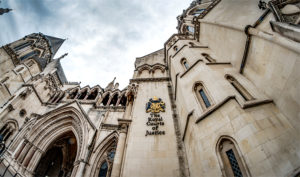 Dónal O’Driscoll from the Undercover Research Group explains the Undercover Policing Inquiry preliminary hearing on 20-22 November 2017 about the Rehabilitation of Offenders Act.
Dónal O’Driscoll from the Undercover Research Group explains the Undercover Policing Inquiry preliminary hearing on 20-22 November 2017 about the Rehabilitation of Offenders Act.
Though attention around this week’s hearing in the Undercover Policing Inquiry is dominated by attempts to keep the details of undercover officers buried, the first day will actually be focused on the Rehabilitation of Offenders Act.
The two issues are closely connected. The new chair, John Mitting, has set out his approach and this is being contested by the victims’ group known as Non-Police/State Core Participants (NPSCPs).
POLICE SEEKING ANONYMITY
As part of their evidence to support former undercover officers’ ‘restriction orders – requests to keep their real and cover identities anonymous – the police are privately presenting the convictions of activists in the groups that were spied on. They’re doing this even though some of these convictions are considered spent under the Rehabilitation of Offenders Act. The police’s argument is that it shows that officers will be in physical danger if they are named.
However, it is being argued that under Rehabilitation of Offenders Act 1974 (ROA), there is an expectation that offences that are spent should not be used unless strictly necessary and that there are appropriate safeguards. Furthermore, it is wrong to deny those whose convictions are spent from having input on how they are being used.
This and other issues have caused a legal quagmire, and throughout this year they have produced a slew of some of the most technical legal documents I’ve ever had the misfortune to read – known as ‘eye bleeders’, as that is the effect you are left with when finished reading them.
However, having simmered away, the arguments have reduced down to a proposal by the Inquiry Chair that he will:
(i) Admit spent convictions as evidence for restriction orders if justice cannot otherwise be done.
(ii) Will not at that stage afford the people who have the convictions any ability to know or make representations.
(iii) Ask the Justice Secretary to create an exemption in the ROA 1974, whereby it is possible to designate any inquiry held under the Inquiries Act 2005 (as this one is) as exempt from the ROA – and designate the Undercover Policing Inquiry as so exempt.
The language of (i) reflects that set out in the 1974 Act, and is not particularly contentious. Indeed, the NPSCPs, as represented by Philippa Kaufmann QC & Ruth Brander, argue this is the correct approach.
Rather, it is (ii) and (iii) which they contend are problematic, and it is for this reason they have asked for an oral hearing on the matter.
UNSPENDING CONVICTIONS
Before we get to the NPSCPs full argument, it is worth quickly summarising what Mitting and the Metropolitan Police have said.
Mitting has noted that a prominent element in his decision not to allow those with spent convictions to know or make representations at the restriction order stage is the time that this would take and the costs that would be incurred. He says he wants the person with the spent convictions to have a chance to respond, but only during the substantive, evidential phase of the Inquiry if it’s necessary. As far as he is concerned, this is the safeguard open to them, as any restriction order can be revisited later in proceedings.
‘What fairness requires is the person affected [i.e. whose spent conviction is being used] should, if practicable, have the opportunity to make representation and to give evidence about the spent conviction and circumstances ancillary to it in the substantive phase of the Inquiry.’
– (Mitting, Minded-To note of 2nd August 2017, para 9)
However, there is a logical gap here. How is an individual to learn their spent conviction has been used secretly to justify hiding someone’s identity? If you don’t know it’s been used, you can’t make a representation around it. All power remains in the Chair’s hand to recognise the moment and inform the affected person.
Or worse, in the situation where a restriction order prevents the release of a cover name, the individual may never learn that they were spied on in the first place and therefore will be denied the chance to make any representations. In effect, the Chair will have made a finding of fact.
Mitting has already held a number of secret closed hearings in which he considered spent convictions. In one note he tells us he has already been considering spent convictions but such that he has ‘no regard for spent convictions’ for those whose convictions are all unspent.
However, where someone has unspent convictions he has been considering all their convictions, spent and unspent equally. He justifies this on the grounds they appear to evidence a pattern of conduct relevant to the issue. He has already done this in a small number of cases on the grounds of being fair to the undercover officers. Thus, he summarises, it is a small but necessary part of the assessment, though minimal in the overall process.
WHAT THE POLICE WANT
The Metropolitan Police’s position is that once someone is told their spent convictions are being used, the cat is out of the bag, the person will be able to guess which of their comrades was an undercover police officer, and it will totally undermine any restriction order. Fairness to the undercover officers is the more important aspect in their assessment.
They make no mention of the fact that undercover police officers are known to have orchestrated wrongful convictions of dozens of activists and the true total is likely to be in the hundreds, possibly the thousands. These miscarriages of justice will cause a second injustice if they are used by police to deny their victims the truth about what was done. Essentially, a police officer can have falsely labelled an activist as a violent villain and now use that label to avoid accountability.
The police noted that whether a conviction is unsafe or not, it does not necessarily change the end assessment of risk, but that the Inquiry is able to loosen the restriction order at a later date. As such, they are content they can rely on the Chair to conduct things fairly.
The police who have already spent years delaying the Inquiry say they are also concerned the timetable will be jeopardised by the extra work notifying people whose convictions are being used, and are mindful of Mitting’s need to avoid unnecessary cost.
WHAT THE VICTIMS SAY
The Non Police/State Core Participants take issue with this, particularly (ii) and (iii) above. These arguments can be summarised as:
For part (ii);
(a) It undermines the Inquiry’s ability to get to the truth and allay public concern.
(b) They are contrary to Article 8 (rights to privacy) of the European Convention on Human Rights with regards to spent convictions.
(c) They are unfair with respect to duties under the Inquiries Act 2005 and the Data Protection Act.
(d) The Inquiry is at risk of applying the wrong test in law for admission of evidence of spent convictions.
For part (iii);
This proposal is an unnecessary and disproportionate interference with Article 8 rights of those who would otherwise enjoy protections under the Rehabilitation of Offenders Act.
The NPSCPs legal counsel have developed these arguments further in a substantial response to the Chair.
Thus, for objection (a), they note that it compromises core participants’ ability to participate in the inquiry, not least as they have been granted core participant status on the grounds that they themselves may be subject of criticism and should have the right to respond. It fails to allow for conflicts in evidence to be resolved. It likewise fails to allay public concern on how secrecy around undercover policing led to abuses in the first place.
Significantly, it precludes evidence from emerging that may actually undermine the basis for seeking anonymity for the undercover officer. This is particularly iniquitous as one of the key purposes of the Inquiry is to look at where such injustices may have arisen. This needs open hearings where it can be learned, and must not simply rely on assuming police claims that it didn’t happen are automatically true.
In fact, in adopting this approach, the Inquiry is assuming the truth of what the police are saying in the first instance, and thus preventing the exposure of miscarriages of justice. In doing this, the Inquiry undermines its own purpose.
Objection (b) is argued on the grounds that the courts have maintained that it is unlawful for spent convictions to be used in this way, precisely because it is an unwarranted interference with Article 8 rights. The risk is that convictions will be used disproportionately, especially where there is a question over their lawfulness.
As such, the NPSCPs note that a fundamental rule of fairness is that a person who may be adversely affected by a decision should have an opportunity to make a representation, and this unfairness cannot be rectified after a decision is made, because the Inquiry process may effectively end up excluding them from doing so.
The exception to the Rehabilitation of Offenders Act being sought is a blanket one, an argument based on expediency and efficiency. However, the Inquiry is ignoring other options for affected participants to feed in, which undermines the restriction order process in that sense as well. And a consequence, it again prevents a person from learning of important information affecting their private life they are otherwise entitled to under Article 8.
Not least, as objection (c) notes, the person whose spent conviction is being used in this way needs to be able to challenge the process where the information being being used. A blanket approach ignores wrongly the case-by-case specific approach which the Act envisaged.
LET JUSTICE BE DONE
The remaining points require a bit more legal technicality. Under section 7(3) of the Rehabilitation of Offenders Act, there is an exception for using spent convictions where it is necessary for justice to be done. The NPSCPs accept this is the correct test and that the case law around it applies. This case law requires that exceptions are on a case by case basis with specific evidence submitted; generalities are not permitted as that would undermine the purpose of the Act.
However, under the Inquires Act 2005, section 19(3) gives powers to the Inquiry to take into account those matters necessary for fulfilling its Terms of Reference. Counsel to the Inquiry has argued this amounts to the same thing (‘co-extensive’), but the NPSCPs disagree. They point out that the Inquiries Act is only concerned with the Inquiry’s work, where as the Rehabilitation of Offenders Act has wider public interest matters that need to be taken into account.
Justice for the individual concerned needs to be placed in the wider context of the Inquiry, regardless of whether it is admitted in private or not. Section 7(3) of the Act gives affords the greater protection of the individual as rehabilitated after a period determined by Parliament. Thus, the Inquiry is in danger of going behind the will of Parliament in this.
This is the core of objection (d), but also the objection to (iii), the proposal to get a statutory exemption for any Inquiry designated as being exempt from the protections of the Act. In this, the NPSCPs are seeking to prevent a wider undermining of the intentions of the Act.
They argue that Mitting’s proposal in (iii) is too loose in that it will lose individual considerations around relevance and necessity, and that the Inquiry does not sufficiently acknowledge the difference with the test provided under the Act’s Section 7(3). It is also pointed out that it does not matter if there is no public disclosure of the spent convictions, as it is the use of them that engages Article 8 rights.
The proposed amendment to the Rehabilitation of Offenders Act is to be done simply to remove administrative burden, being done for expediency rather than explore alternative approaches, and so loses the safeguards implicit in S7(3). For this reason the Inquiry should rely on S7(3) only, as it effectively sets out in part (i) of the Chair’s proposed approach.
I’m aware that I have brushed over a lot of issues and technicalities in this summary, but for a fuller understanding of where matters stand at the time of the 20 November hearing, it is worth reading the latest NPSCP and Metropolitan Police submissions and the Minded-To note of Mitting on the Undercover Policing Inquiry website.
Update (11 December 2017): The arguments were heard at the 20 November 2017 hearing and he made his ruling on 29 November where he went pretty much with the contents of his previous minded-to.
Mitting reiterated that his taking into account of spent convictions when considering restriction orders was limited, that they formed a small but necessary part of the process. He rejected non-police/state core participants proposal that they should be able to make submissions where convictions were being relied upon, as it would amount to a mini-trial over a finding of fact.
He believes that the correct time to examine whether those convictions where sound in the first place and didn’t not amount to a miscarriage of justice due to the role of a spycop would be during the substantive, evidence phase of the Inquiry. Thus brushing over the point, that were such a conviction is being used to justify restriction of an officers cover name it may prevent such evidence ever coming out in the first place.
While not a significant issue for undercovers dating up to the 1980s, we strongly suspect the issue of spent convictions with potential associated miscarriages of justice is going to be a bigger issue for later deployments, especially in the 1990s and 2000s.
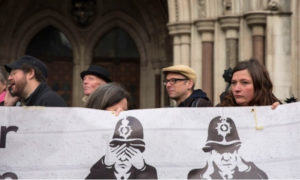 The Undercover Policing Inquiry was announced nearly four years ago and still has not begun. Around 200 significantly affected victims have been designated ‘core participants’. At the recent preliminary hearing, the state had 11 lawyers whilst the victims were only allowed one.
The Undercover Policing Inquiry was announced nearly four years ago and still has not begun. Around 200 significantly affected victims have been designated ‘core participants’. At the recent preliminary hearing, the state had 11 lawyers whilst the victims were only allowed one.
 Seven women deceived into long-term intimate relationships by undercover police officers have lodged a complaint with the UN Committee on the Elimination of Discrimination Against Women (CEDAW).
Seven women deceived into long-term intimate relationships by undercover police officers have lodged a complaint with the UN Committee on the Elimination of Discrimination Against Women (CEDAW).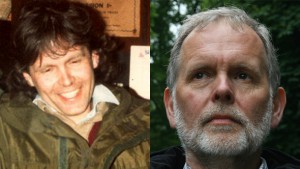

 Dónal O’Driscoll from the
Dónal O’Driscoll from the 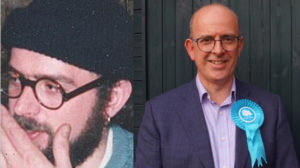
 Guardian columnist Paul Mason has
Guardian columnist Paul Mason has 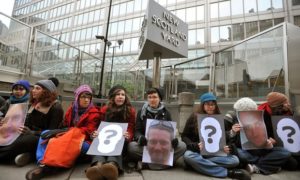 Over 100 people affected by political policing, frustrated by the Undercover Policing Inquiry’s lack of openness, are demanding answers and action.
Over 100 people affected by political policing, frustrated by the Undercover Policing Inquiry’s lack of openness, are demanding answers and action. A new member of Britain’s political secret police has been named. On 5th October, the
A new member of Britain’s political secret police has been named. On 5th October, the 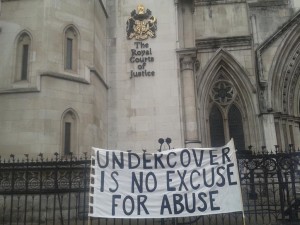 Today, thirteen women who were deceived into intimate sexual relationships with undercover policemen, over a period spanning nearly 30 years, have written to the Home Secretary to raise their concerns about the progress and recent direction of the
Today, thirteen women who were deceived into intimate sexual relationships with undercover policemen, over a period spanning nearly 30 years, have written to the Home Secretary to raise their concerns about the progress and recent direction of the